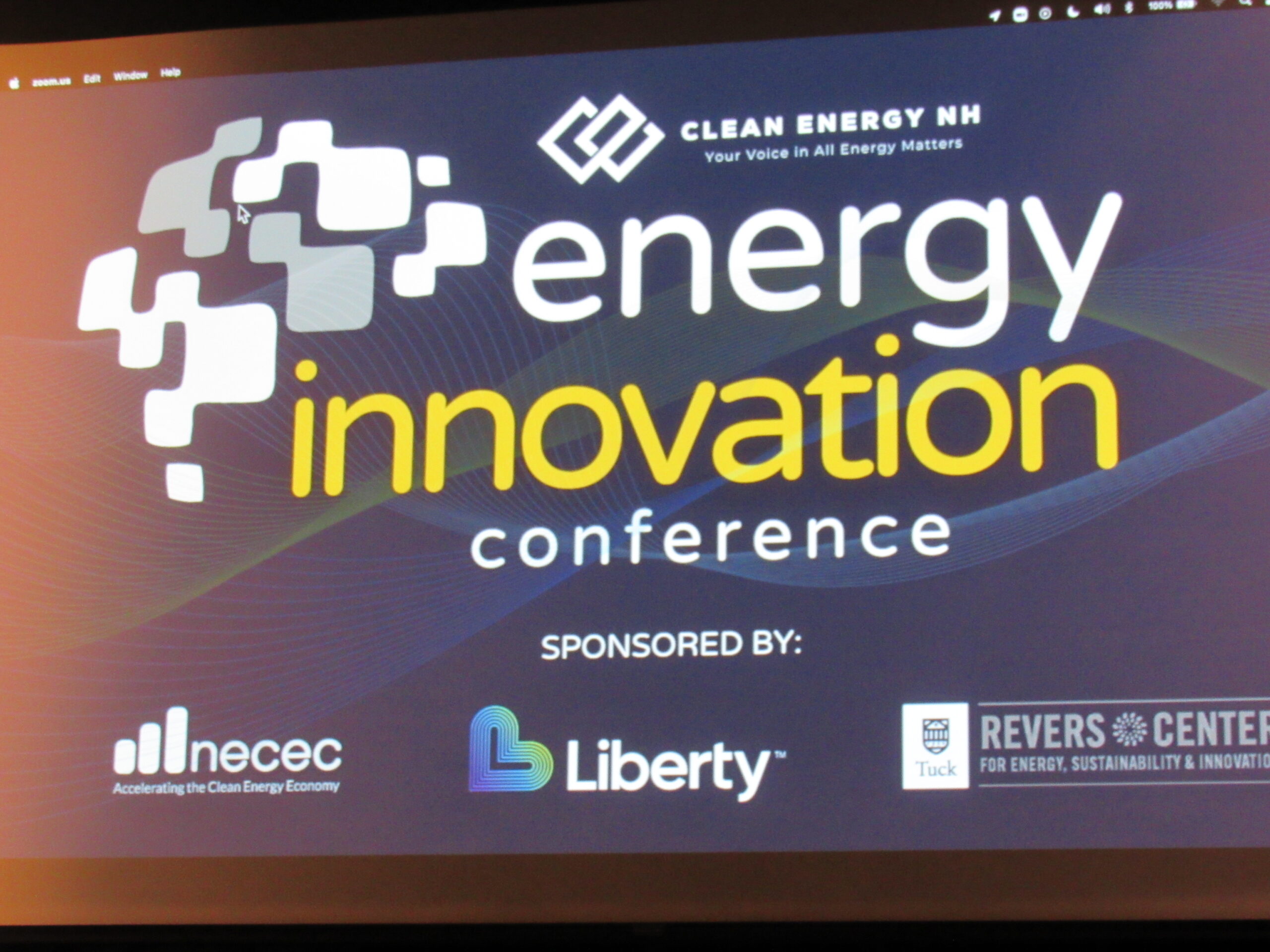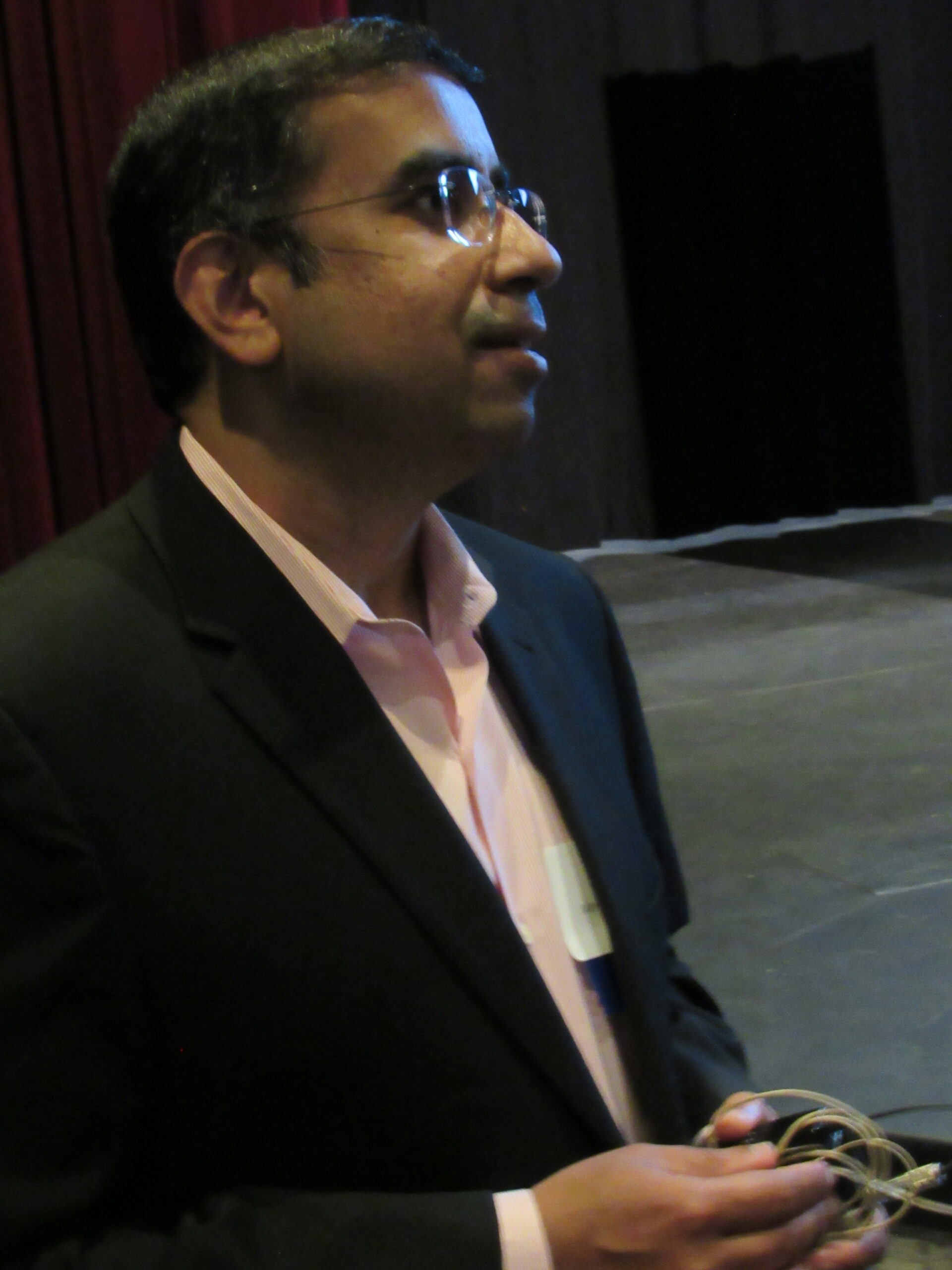
MANCHESTER, NH – Approximately 125 attendees representing both business and academia heard six speakers address cutting-edge energy-saving technologies at New Hampshire’s first Energy Innovation Conference Tuesday afternoon.
The presenters represented private companies and the Ted Talk format was emceed by Sam Evans Brown, executive director of Clean Energy New Hampshire.
“We are literally decades ahead of where we thought we’d be when it comes to the price of solar,” Brown said in his opening remarks. “The future is now.”
East Region Director of Regulation and Government Affairs for the publicly-traded Nuvve Holding Corporation Steve Letendre was one of the four speakers who addressed the near-future of electric vehicles (EVs). The company has proprietary vehicle-to-grid (V2G) technology. It may feel like a quantum leap to have EVs sell surplus electricity back to the grid, but Letendre claims it’s already happening in Sweden to the tune of $2,000 over the lifetime of an EV.
“The EV era is upon us,” he said. “Half a million EVs were sold in the U.S. in 2021. By 2030 that number will be 4.5 million or one-third of all vehicles sold. That will deliver 45 gigawatts of electricity back to the grid. That’s a big number.”
Think of the 15-watt LED light in your home. One gigawatt equals one billion watts.
Year-to-year revenue for the first quarter in 2022 was up 196 percent from the same quarter a year ago for Nuvve.
Letendre opened his talk with, “We’re here to talk about how energy innovation is going to make life easier. It’s a synergistic opportunity.”
Peterborough’s IMBY Energy, Inc. was founded by Steve Walker. The self-taught engineer and self-described “rural geek” also started the Jaffrey-based New England Wood Pellet in his garage 30 years ago. The success of the company saw Walker leave in 2014. Since then the entrepreneur has pivoted to address other home energy concerns and has keyed in on compressors.
“The global market has five billion compressors in use,” Walker told the audience via Zoom. Five hundred million are sold annually. That’s forty percent of the entire energy market.”
Until recently, unless you were in construction, building heat compressors were out of sight and out of mind, primarily in larger buildings.
IMBY and its sister Maine and Massachusetts-based company Micro Turbine Technologies (MTT) have developed what Walker called a “home energy system,” built around heat compressors, more commonly known as heat pumps.
Walker is above all a problem-solver. He designed the pellet heating system before he had a definitive fuel.
The entrepreneur cited three problems in developing a more efficient compressor: 1. Size and weight. 2. Loss of polluting refrigerants. 3. Operation at hotter or colder temperatures.
“Our next-generation compressor uses one-tenth of the material, weighing in at five pounds instead of 50,” Walker explained. “It has no polluting refrigerants, and can operate between minus 50 to 150 degrees centigrade.”
According to Walker, it’s also 30 to 50 percent more energy-efficient and can extend the range of an EV 50 miles in the cold, the more problematic extreme temperature. The transportation compressor variant is geared for large EV trucks and busses.

“Compressors are the missing link in the energy equation,” Walker said. “A heat pump becomes a closed-loop generator, using energy storage and reducing the BTU cost 50 percent.”
Presenter Hari Nayar is the vice-president of Fleet Electrification and Sustainability for Merchants Fleet, the division of Merchants Auto dealing in commercial trucks and busses.
Nayar also designed the electric integration system for the Ford F-150, the first EV pickup truck.
“Transportation is going through the biggest innovation in 50 years,” Nayar said. “Tailpipe emissions are a fundamental problem that needs to be addressed. We believe we are at a tipping point.”
Two of Merchant Fleet’s biggest clients are UPS and Amazon.
The designer and developer hit the audience with a powerpoint slide comparing a standard Ford pickup with a Ford EV pickup. Initial cost favors the internal combustion engine at $36,900 vs. $48,900 for the EV version. According to Nayar, this $12,000 gap is closed in two years as fuel costs are no contest at $6,644 annually compared to $1,680 for the EV. Idling cost is $1,106 for the internal combustion engine vs. $37, while maintenance costs are $980 vs. $500.
New Hampshire had exactly two public EV charging stations a decade ago. It now has 132.







